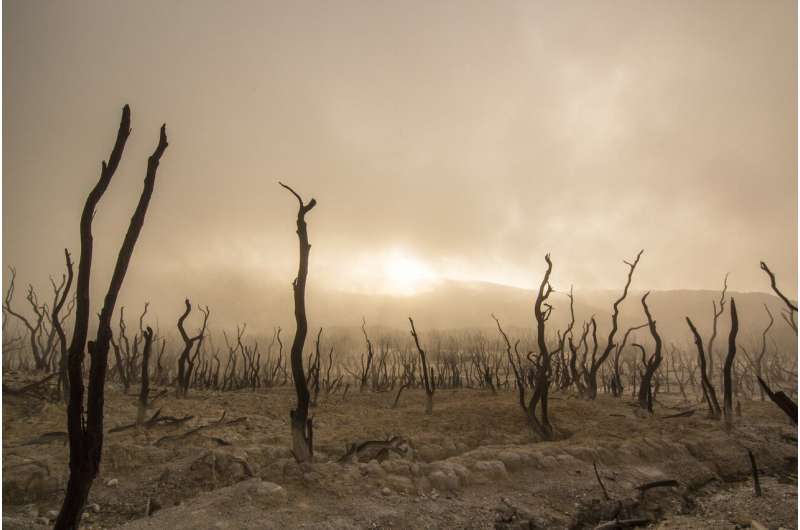Pathways to changing the minds of climate deniers

Want to sway the opinion of climate deniers? Start by acknowledging and respecting people's beliefs. That's one of four suggestions a Stanford researcher unearthed in a review of the psychology behind why some people reject climate change despite knowledge or access to the facts.
Denying the effects of climate change serves as a barrier to taking the actions needed to mitigate the worst effects, including rising seas, more intense hurricanes and increased droughts and heatwaves. However, the researchers found that those who deny human causes for climate change can be swayed through conversations that appeal to their different identities, reframe solutions—or even embrace their climate views.
"I think in the climate change sphere there's this thinking of, 'there's the deniers over there, let's just not even engage with them—it's not worth it,'" said behavioral scientist Gabrielle Wong-Parodi, lead author of the paper published in Current Opinion in Environmental Sustainability Jan. 8. "A lot of the tactics and strategies start from the point that something is wrong with the climate deniers, rather than trying to acknowledge that they have a belief and opinion and it matters. But I think there is an opportunity to keep trying to understand one another, especially now."
The researchers focused on what is referred to as "motivated denial"—knowing or having access to the facts, but nevertheless denying them. For some people, accepting that humans cause climate change questions self-worth, threatens financial institutions and is accompanied by an overwhelming sense of responsibility.
Although efforts to sway climate deniers may seem futile, the researchers found four approaches in peer-reviewed studies from the past two years that could be most effective:
1. Reframing solutions to climate change as ways to uphold the social system and work toward its stability and longevity
2. Reducing the ideological divide by incorporating the purity of the Earth, rather than how we harm or care for it
3. Having conversations about the scientific consensus around climate change with trusted individuals
4. Encouraging people to explicitly discuss their values and stance on climate change prior to engaging with climate information
Wong-Parodi said she found the fourth approach to be the most intriguing because less research has been done in that area than the other three—and it seems to have a lot of potential for behavior change. Self-affirmation is challenged when people face climate change because it requires them to consider their contribution to the problem, which can threaten their sense of integrity and trigger self-defense.
"A good portion of people who deny climate change recognize that there is some change, but the change is so threatening because it basically could affect your quality of life. It could affect your income. It could affect a number of different things that you care about," said Wong-Parodi, an assistant professor of Earth system science at Stanford's School of Earth, Energy & Environmental Sciences (Stanford Earth).
Some preliminary studies suggest that rather than trying to get around people's identities and denial of climate change, conversations should instead embrace their views. We should not try to ignore who people are, but rather acknowledge their views so that they can be dealt with and the conversation can move on to behavioral changes—such as finding solutions that match their values and do not threaten a person's sense of identity or quality of life, according to Wong-Parodi.
"I think we often forget that people can have many identities—there might be a political identity, but there is also an identity as a mother, or an identity as a friend or an identity as a student," said Wong-Parodi, who is also a fellow at the Stanford Woods Institute for the Environment. "You can elicit other identities when you're talking about climate change that may be more effective."
More information: Gabrielle Wong-Parodi et al, Understanding and countering the motivated roots of climate change denial, Current Opinion in Environmental Sustainability (2020). DOI: 10.1016/j.cosust.2019.11.008
Provided by Stanford University



















